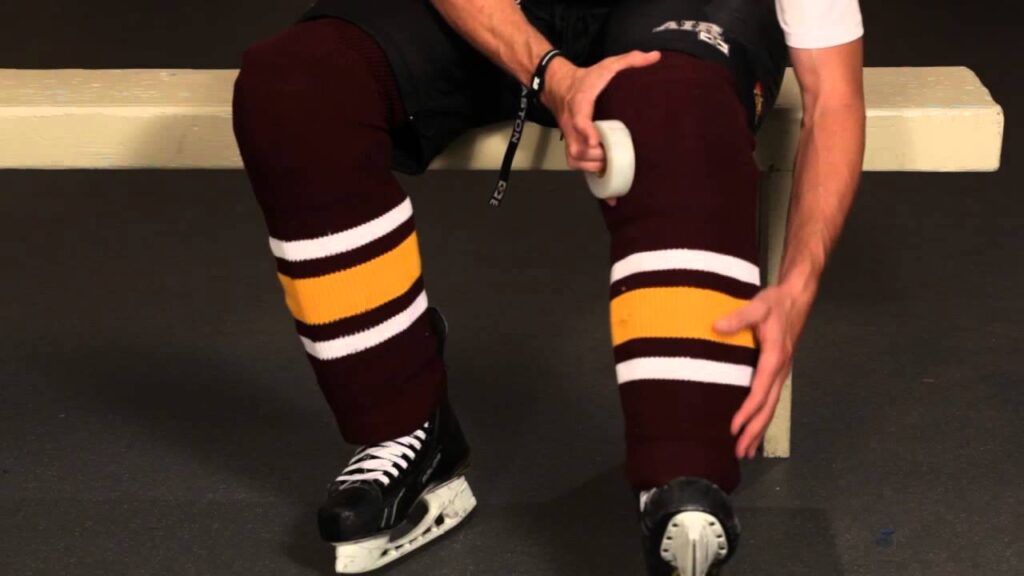To tape hockey socks, start by wrapping clear hockey tape around your shin guards and socks. Ensure the tape is tight but not restrictive.
Taping hockey socks is essential for keeping your gear secure during intense gameplay. Proper taping provides stability to shin guards and prevents socks from slipping. Begin by placing the shin guards on your legs, making sure they sit comfortably and provide adequate protection.
Next, pull your hockey socks over the shin guards. Use clear hockey tape to wrap around the area just below the knee and above the ankle. Ensure the tape is snug but not too tight to maintain proper circulation. This method not only keeps your gear in place but also enhances your performance on the ice.

Credit: rinkresult.com
Preparation
Before taping your hockey socks, it’s important to prepare properly. This ensures your socks stay in place during the game.
Choosing The Right Tape
Using the correct tape is essential. Hockey tape is the best option. It is durable and sticky. Athletic tape can work, but it may not last as long.
- Hockey tape: Sticky and durable
- Athletic tape: Okay in a pinch
- Avoid duct tape: Too sticky and hard to remove
Getting The Socks Ready
Before taping, make sure your hockey socks are clean and dry. Wet socks can slip and cause discomfort.
- Wash the socks: Remove dirt and sweat.
- Dry the socks: Use a dryer or air dry.
- Check for holes: Patch any holes to avoid tears.
Once your socks are ready, you can start the taping process.

Credit: hockeyinsociety.com
Starting The Process
Learning how to tape hockey socks is crucial for every player. Properly taping your socks keeps them in place during the game. This guide will help you start the process effectively.
Positioning The Sock
First, pull up the hockey sock over your shin pad. Make sure the sock covers the pad fully. The sock should reach just below your knee.
Check that the sock is straight and not twisted. Adjust it so the heel and toe areas fit correctly.
Initial Wrap
Take a roll of hockey tape and start at the top of the sock. Wrap the tape around your leg, just below the knee. Ensure the tape is snug but not too tight.
Continue wrapping the tape around the sock. Make sure each layer overlaps slightly. This helps keep the sock secure during play.
Securing The Top
Securing the top of your hockey socks is crucial. It keeps your socks in place during the game. This section will guide you through the steps.
Creating The Anchor
First, you need to create a strong anchor. This will hold your socks firmly.
- Start by pulling your socks up to your knees.
- Take a roll of hockey sock tape.
- Wrap the tape around the top of the sock.
- Go around the leg twice to ensure a secure hold.
Make sure the tape is snug, but not too tight. You should still be able to move freely.
Ensuring Firm Hold
Now, focus on ensuring a firm hold. This prevents the socks from sliding down.
- After creating the anchor, press down the tape with your fingers.
- Check that the tape is smooth and even.
- If needed, add another layer of tape for extra security.
Make sure the tape covers all parts of the sock top. This will keep the socks in place during the game.
Wrapping The Middle
Properly taping your hockey socks ensures they stay in place during play. Wrapping the middle is a crucial step in this process. This section will guide you through a smooth application and how to avoid wrinkles.
Smooth Application
Start by holding the sock in place. Use one hand to keep it steady. Use the other hand to apply the tape.
- Begin wrapping the tape around the middle of the sock.
- Ensure the tape is pulled tight but not too tight.
- Wrap the tape around the sock once or twice.
Make sure the tape is evenly spaced. Overlapping the tape can cause discomfort.
Avoiding Wrinkles
Wrinkles can cause irritation and affect your game. Here’s how to avoid them:
- Keep the sock smooth while wrapping.
- Check for wrinkles after the first wrap.
- Smooth out any wrinkles before continuing.
Use your fingers to press out any wrinkles. This ensures a snug fit without discomfort.
Finishing Touches
The final steps in taping hockey socks are crucial. They ensure your socks stay in place during the game. Let’s dive into the finishing touches, which include securing the bottom and making final adjustments.
Securing The Bottom
Start by making sure the bottom of your socks is tight. This keeps your shin pads from moving around.
Follow these steps:
- Wrap the tape around your ankle.
- Make sure the tape is snug but not too tight.
- Wrap the tape around twice for extra security.
Using two wraps ensures the socks stay in place. You won’t have to worry about them slipping during the game.
Final Adjustments
After securing the bottom, check the overall fit. Make sure the socks are smooth and without wrinkles.
Here are some tips for final adjustments:
- Smooth out any bumps or folds in the sock.
- Make sure your shin pads are comfortable.
- Double-check the tightness of the tape.
Your socks should feel secure but not too tight. If needed, adjust the tape slightly.
With these final adjustments, you are ready to hit the ice. Properly taped socks improve your comfort and performance.

Credit: rinkresult.com
Common Mistakes
Taping hockey socks can be tricky. Many players make common mistakes. These errors affect performance and comfort. Understanding these mistakes helps you avoid them.
Too Tight Taping
One frequent mistake is taping the socks too tightly. Tight taping restricts blood flow. This can lead to discomfort and reduced mobility.
Here are some signs of too tight taping:
- Numbness in legs
- Red marks on skin
- Difficulty moving freely
To avoid this, ensure the tape is snug but not restrictive. You should still be able to move comfortably.
Uneven Wrap
Another common error is uneven wrapping. This can cause the socks to bunch up. It also leads to uneven pressure on the legs.
Follow these steps for an even wrap:
- Start at the top of the socks.
- Wrap the tape in smooth, even layers.
- Ensure each wrap overlaps slightly.
Keeping the wrap even ensures better performance and comfort. Consistent practice helps perfect the technique.
By avoiding these common mistakes, you can tape your hockey socks effectively. Proper taping ensures comfort and enhances your game.
Tips And Tricks
Learning how to tape hockey socks can make a huge difference in your game. Properly taped socks stay in place and keep you comfortable. Here are some tips and tricks to help you get it right.
Using Pre-wrap
Pre-wrap is a thin, foam-like material. It helps in keeping the tape from sticking to your skin. Here’s how to use it:
- Wrap a layer of pre-wrap around your leg, just below the knee.
- Make sure the pre-wrap is snug but not too tight.
- This layer will protect your skin and make the tape easier to remove.
Using pre-wrap can prevent discomfort and skin irritation. It also makes it easier to adjust the tape during the game.
Maintaining Comfort
Comfort is key for a good game. Here are some tips to maintain it:
- Use stretchy tape to allow for better movement.
- Make sure the tape is not too tight to avoid cutting off circulation.
- Check your socks regularly to make sure they haven’t bunched up.
- If you feel discomfort, re-tape your socks for a better fit.
By following these tips, you can ensure your socks stay in place and you stay comfortable.
Conclusion
Mastering the technique of taping hockey socks ensures better performance on the ice. It provides comfort and stability during play. Remember to choose the right tape and follow the steps carefully. With practice, taping your socks will become second nature, enhancing your game and keeping you focused.
Happy skating!


